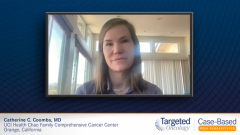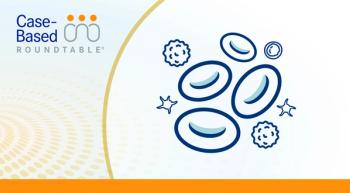
Recent Data on CAR T-Cell Therapy and BTK Inhibitors in Relapsed/Refractory CLL
An overview of recent data from ongoing trials evaluating CAR T-cell therapy and BTK inhibitors in patients with relapsed/refractory CLL.
Episodes in this series

Case: A 70-Year-Old Man with R/R Chronic Lymphocytic Leukemia (CLL)
- Patient AL is a 70 y/o man.
- PMH: T2DM and Hypertension (both well controlled with medication)
- SMH: Does not smoke or drink alcohol.
Clinical Presentation:
- In July 2022, AL was diagnosed with CLL and had been previously treated with venetoclax plus obinutuzumab upon initial diagnosis. Less than 6 months later, AL presented to his oncologist reporting an unresolved fever and increased fatigue.
Clinical Workup and Molecular Testing:
- Laboratory Findings:
- WBC: 120,000
- Hgb, 9.1 g/dL
- Platelets, 92 x 109/L
- Molecular Testing:
- Elevated serum beta-2-microglobulin
- Flow cytometry, CD5+, CD19+, CD23+
- IGHV/TP53 mutational status: unmutated
- FISH detect del(17p)
- ECOG PS 1
Disease Relapse and Treatment(s):
- Further disease progression was documented, and a joint decision was made to initiate AL on venetoclax plus rituximab.
- Venetoclax Dosing Ramp-Up Schedule
- Starting dose of 20 mg PO QD x 7 days, then weekly ramp up to 50 mg, 100 mg, 200 mg, and 400 mg PO daily. The recommended daily dose (400 mg) continues from week 5 and beyond for 24 months.
- Rituximab 375 mg/m2 on C1D1 (28-day cycle), then 500 mg/m2 on Day 1 for 5 cycles (completing after month 6).
- Venetoclax Dosing Ramp-Up Schedule
Transcript:
Catherine C. Coombs, MD: Regarding data from ongoing trials, one therapy that has been particularly interesting in CLL [chronic lymphocytic leukemia] is the use of CAR T cells. Dr [Tanya] Siddiqui published the experience from the TRANSCENDCLL 004 trial (NCT03331198), which is examining the use of liso-cel [lisocabtagene] in patients with relapsed/refractory CLL. This was published in Blood and I think the results are very interesting, but I wouldn’t say I would call it a game changer quite yet. The median PFS [progression-free survival] for the patients in this study was around 18 months, but when looking at double refractory patients, which are patients who had failed prior therapy with a BTK [Bruton tyrosine kinase] inhibitor and venetoclax, the median PFS was around 13 months. I wish the PFS were longer, but this still does represent a significant advance. The main issue with CAR T is that they are somewhat difficult to administer, and I think the CLL patient population has exposed unique challenges. The disease is known to lead to T-cell exhaustion, and so one theoretical concern of the short-lasting effect of these CAR T cells is perhaps related to the fact that patients in this study, who were very extensively pretreated, may have had suboptimal expansion and performance of their own T cells.
That being said, I am still excited to see longer follow-up to see if there is a plateau in the PFS curve, because we do know that there are rarely longer-term responders to CAR T cells even among patients with CLL. I’ll also be interested in seeing the other part of this study, which combines CAR T cells with ibrutinib. Now, the reason for doing that is ibrutinib may help some of this underlying immune dysfunction, so it’ll be interesting to see how that cohort of this study performs with longer-term follow-up.
Some of the other recent studies that we’ve seen include the ASCEND trial (NCT02970318), which is the study that led to acalabrutinib’s FDA approval in the relapsed/refractory setting. To remind you on the study design, this is actually the first novel-novel phase 3 comparison in CLL. Patients received either acalabrutinib as a continuous monotherapy or they were randomized to a physician’s choice regimen of either idelalisib with rituximab or bendamustine and rituximab. The patients who received acalabrutinib had a significantly superior progression-free survival, which lends support to using BTKIs in the relapsed refractory setting over these other regimens. As I mentioned, I already don’t use much of idelalisib due to the toxicity profile with a number of “itises” as they call it; colitis, pneumonitis, etc. Then bendamustine, I’d already mentioned I don’t use much of in favor of VenR, based on the MURANOtrial (NCT02005471), but also this trial supports the use of a BTK inhibitor.
The BRUIN study (NCT03740529) is another exciting trial for which we saw an update at ASH [American Society of Hematology] in December. This is the large phase 1/2 trial of pirtobrutinib. Pirtobrutinib is, some say, a third-generation BTK inhibitor, but it’s actually different than all of its predecessors, which were covalent drugs. Pirtobrutinib is a noncovalent drug. It binds its target BTK reversibly, and so this helps in patients who have resistance to covalent BTK inhibitors through the most common mechanism being the acquisition of a C481S mutation, which does not allow the covalent drug to form its bond and inhibit its target effectively.
This trial, in this update at ASH, reviewed patients who were treated with pirtobrutinib, who had already had a prior covalent inhibitor. The majority of these patients had progressed on the prior covalent drug, though around a quarter had intolerance. What we see is that the drug works very well, with a PFS of around 20 months, and not only is it effective, with higher overall response rates with this longer-term follow-up around 80%, but it’s very safe. Very few patients needed to discontinue the drug due to adverse effects; I think it amounted to around only a 2% discontinuation rate. I’ll be looking forward to longer-term follow-up of pirtobrutinib, which is the subject of a number of different phase 3 trials that are accruing currently.
The other hot topic at ASH was the ALPINE trial (NCT03734016). This was the phase 3 trial that compared zanubrutinib with ibrutinib in patients with relapsed and refractory CLL. This was also published in the New England Journal of Medicine. It was a positive study in that zanubrutinib led to superior progression-free survival and overall response rate as compared with ibrutinib. It also had a favorable safety profile, specifically with respect to its cardiac toxicity. The rate of A-fib [atrial fibrillation] with zanubrutinib was 5% compared with ibrutinib’s 13%. There were zero cardiac deaths for the zanubrutinib-treated patients, compared with 6 for the ibrutinib-treated patients. It was somewhat of an interesting study design. The primary end point was actually overall response rate, but PFS was a secondary response criteria end point. Both of those were positive, and as such, zanubrutinib was FDA approved for CLL in January.
These emerging data do impact our future considerations, especially in what I would consider one of the major unmet needs in CLL, which is patients who have been failed by both covalent BTK inhibitors and venetoclax. At least right now, there aren’t good standard-of-care options for this cohort of patients who have been termed “double refractory.” With pirtobrutinib, there was a subset analysis that showed that that drug actually has very good progression-free survival in this double refractory subset of patients on the order of around a 16- to 18-month range, which is a major advance over anything that is currently available off the shelf, such as PI3 kinase inhibitors, chemoimmunotherapy. In real-world studies, the PFS for those treatments is probably more around 4 to 5 months. CAR T also could potentially represent a major advance. The median PFS for the double refractory patients on the TRANSCEND trial, as I had mentioned, is 13 months. So I do think that these options are allowing for extension of life and extension of progression-free periods for patients. I look forward to when they’re more widely available.
Transcript edited for clarity.



















